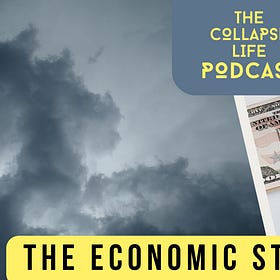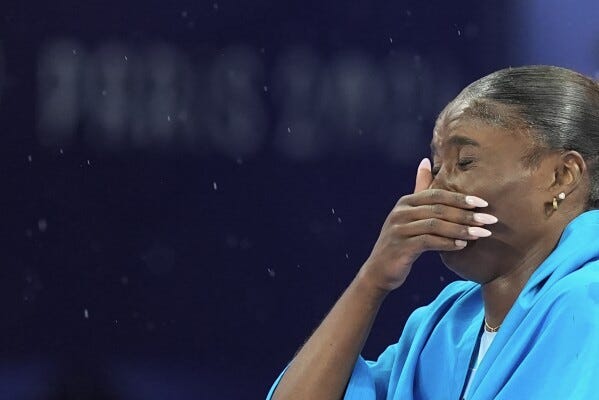Notes from the edge of civilization: August 4, 2024
China rejects IMF proposal to bail out property market; Gold hits new highs; the current and projected value of Olympic gold; and Peter Grandich's advice to weather the economic storm ahead.
The International Monetary Fund (IMF) last week proposed that the Chinese government essentially bail out its ailing property market to the tune of 5.5% of GDP over four years. The recommendation is to use “one-off” resources to complete and deliver pre-sold properties or compensate homebuyers for the unfinished units.
“The policy priority should now be the timely resolution of unviable developers and the deployment of central government (CG) financing to accelerate completion of unfinished, pre-sold housing, which would help restore homebuyer confidence,” the IMF wrote in its latest staff report on China.
China’s reaction? ‘No thanks.’
Stabilizing the property sector has been a top priority for the CCP in recent years, as it aims to revive the world’s second biggest economy. A once-thriving housing market has been in a tailspin since around 2018. In May 2024, the central bank created a 300 billion-yuan ($42 billion) fund to help local governments buy completed but unsold homes to turn into subsidized housing. But beyond that, policymakers seem reluctant to unleash government bailouts as a widespread tactic.
“We believe that we should continue to apply market-based and rule-of-law principles in completing and delivering these units,” Zhang Zhengxin, the IMF’s executive director for China, wrote in a response included in the staff report. “It would be inappropriate for the central government to directly provide fiscal support, as it could lead to expectation of future government bail-out and therefore moral hazards.”
China’s property downturn and sluggish economy have created gloomy consumer confidence, leading to a mini gold rush in the People’s Republic. With limited opportunities for capital preservation, sales of gold bars and gold coins in China surged by 46 per cent in the first half of the year, according to the China Gold Association.
Globally, gold prices are up more than 18% this year, hitting record highs three times in less than three weeks. Gold topped $2,500 an ounce at its recent peak, according to Market Watch.
As Collapse Life readers know, gold is a safe-haven investment during economically uncertain times. So when gold prices go up, things must be getting bad. This week, veteran financial expert Peter Grandich returned to the podcast to explain just how fierce the economic storm we’re witnessing really is, and what we can do to weather it.
Don’t miss this critical conversation, and please share it with others in your life who could benefit from Peter Grandich’s wisdom and experience.
10 ways to navigate the coming economic storm
In the latest episode of the Collapse Life podcast, financial expert Peter Grandich returned to share his thoughts on the current economic climate and what people can do to prepare. When someone with Grandich’s experience — over 40 years on Wall Street — tells you to get ready for a rocky road ahead, it’s probably a good idea to take heed.
Speaking of gold, what’s behind the tradition of Olympic competitors biting their medals? The answer dates back a few centuries and involves sniffing out forgeries. Dominic Frisby lays out the details in a new post, and further explains that athletes in Paris can expect their first-place medals to only include about 1% gold.
With each Olympic gold medal consisting of 523 grams of silver coated in only 6 grams of gold, how much is a medal worth based on current commodity prices? Less than you might expect, according to Oxford Economics:
“We estimate that the value of each gold medal during these Olympic Games is more than a thousand USD – specifically US $1,027, while silver and bronze medals are worth US $535 and US $4.6, respectively. By 2028, during the Los Angeles Olympics, the gold medals will have increased to US $1,136, while silver medals will be US $579 and bronze medals will be US $5.2.”
[Editor’s Note: For those new to the concept of gold as a store of value — and similar commodities, more generally — it’s worth highlighting that gold isn’t actually ‘increasing’ in value in the above example, but rather the purchasing power of the US dollar is decreasing. Prepare accordingly.]
Beyond the glory of winning, medalists can benefit in a number of other ways depending on what country they are from. This year the US is giving medalists $37,500 in cash for winning gold; $22,500 for silver and $15,000 for bronze, according to the Associated Press. Host country France will gift its gold medalists around $85,000, with $43,000 for silver and $22,000 for bronze, according to French news outlet Capital. Kazakh medalists get an apartment: three rooms for gold medalists; silver medalists get two-room apartments and bronze medalists get one-room apartments.
Indonesia gifted its women’s doubles badminton gold medalists nearly $350,000 after their win at the last Olympics. One player was also promised five cows and a house on Sulawesi island, and a chain of meatball restaurants pledged to give each player her own outlet.
For St. Lucian runner Julien Alfred, the real prize is becoming the first athlete from her country to ever win gold at the Olympics. “It means a lot to me. It means a lot to my coach. It means a lot to my country,” 23-year-old Alfred said on Saturday after edging out Sha’Carri Richardson of the US to take the 100-meter dash in 10.72 seconds. “I’m sure they’re celebrating right now.”







